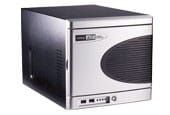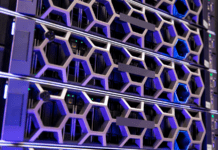Iomega’s latest foray into NAS takes a radical departure from the standard rack-mounted design, often referred to as a pizza box, and instead offers an attractive, desktop device that’s roughly the size of a shoebox. More than just a pretty face, this NAS box comes standard with Microsoft Windows Storage Server 2003 — an industry first in a box this size.
Both the NAS Series 200d 320GB and the NAS Series 480GB servers use RAID configured-drives to protect data just in case a drive should fail. The 320GB is available in RAID 0,1, while the 480GB version offers RAID 0,1 and 5 protection.
Iomega uses state-of-the art Serial ATA (SATA) drives to increase performance. The drives are what’s known as cold-swappable, meaning that you can remove them yourself once you’ve shut down the system. That’s a big advantage to any business that doesn’t have full-time tech support on site. When it comes time to upgrade, or if you should have a drive fail, instead of packing up the entire unit to ship back to the factory, all you do is shut down the system, pull out the drive that needs replacing or upgrading, and pop in a new one. You’re back in business — without substantial down time that can cost you big bucks.
Other features designed to protect and manage data include:
- Windows Storage Server 2003 for ease of installation and familiar management tools
- A quiet and space-efficient enclosure
- Four USB 2.0 ports and one Ultra SCSI 320 port (480GB only) for adding high-speed backup devices.
- Storage and file-sharing capability from remote locations — even with limited IT staff
- Supports Windows, Mac, Linux UNIX and Netware clients
- Includes Iomega’s Automatic Backup Software and Computer Associates’ eTrust Anti-virus Software
 |
|
Little Big Box: Iomega packs a lot of storage, along with Windows Storage Server 2003, into a space-conscious package. |
Why Microsoft?
According to Wayne Arvidson, director of professional storage at Iomega, adding Microsoft Storage Server 2003 makes perfect sense for small businesses. “Most small businesses run one of the Microsoft operating systems on their desktops, so it’s familiar,” he says. “Even if you have no IT experience, this server is easy enough to get up and running in 15 minutes. It’s storage you already know how to use. If you can manage your Windows desktop, you can manage this box.”
The server’s operating system software comes pre-configured and ready to use. Features include:
- Volume Shadow Copy Services (VSS): Lets you create up to 64 point-in-time data restore points per volume and quickly restore deleted or corrupted data.
- Distributed File System (DFS): Makes finding and managing data on various network servers easier.
- File Replication Service (FRS): Keeps identical sets of files and directories on different servers so that whenever a file gets updated on one server, the file replication service replaces the corresponding files on all the other servers.
- Encrypting File Systems (EFS): Stores encrypted data so even if the hard disk is moved and installed in another system the data remains secure.
Both models in the NAS 200d series are available mid-June through VARS, direct marketers and catalog retailers. The Iomega NAS 200d Series 320GB lists at $1,399 and the NAS 200d 480GB sells for $1,999.
Article courtesy of SmallBusinessComputing.com





